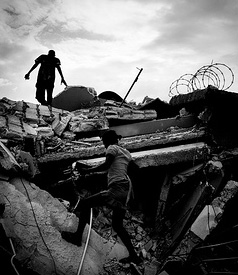Overwhelmed by sadness, empathy and disbelief, the world’s eyes and hearts are focused on the rescue and relief efforts resulting from the earthquake in Haiti. However, many who have worked in Haiti fear that a preventable and long term disaster lies on the horizon if international interventions do not break with past patterns. As international aid begins to pour into Haiti, we have a brief moment to break with past mistakes and bring real change to Haiti.
During the eight years that the Robert F. Kennedy Center for Justice and Human Rights (RFK Center) has partnered with the grassroots medical group Zanmi Lasante/Partners In Health in Haiti, we have witnessed U.S and international aid efforts that could be characterized, at best, as unsustainable and, at worst, deliberately harmful.
In 2000, the U.S. and the Inter-American Development Bank approved millions of dollars of what would have been lifesaving loans for improvements to water, health, education, and road infrastructure, only to later withhold these funds because they opposed then President Aristide. While the loans were eventually released, the communities where the very first water projects were to be financed still lack access, ten years later, to reliably clean drinking water, contributing to countless deaths due to waterborne illness.
In 2004, the international community pledged $1 billion to support Haiti. RFK Center, along with Zanmi Lasante and the NYU Center for Human Rights and Global Justice, tried to track the fulfillment of those pledges, but never received clear and consistent answers from donor states on the status of the aid. With no transparency or coordinating body to turn to, the Haitian people had no hope of knowing if that money ever got to Haiti, much less where it was directed and how it could be used to improve their communities. Haitian government sources later confirmed that most of the pledges had never been fulfilled.
In 2008, after hurricanes ravaged the country, the international community convened another donor conference resulting in over $324 million in pledges. Prior to the earthquake, most of those pledges had still not been fulfilled.
Historically, interventions in Haiti have been viewed through the lens of charity. The international community, NGOs, international organizations and donor states have gathered time and again to announce to the world pledges of support, only to quietly back away from these commitments. The goodwill of the international community is certainly critical today to Haiti’s future but charity alone will not be enough to ultimately rebuild a safer and more sustainable Haiti. Only by forging a new path, guided by a commitment to the human rights of the Haitian people, can the international community help to create real, lasting change.
Charity is a personal act of choice with no real repercussions. Human rights are legal obligations, grounded in our shared acknowledgement of human dignity – something that every government must respect and no government can take away.
In the aftermath of this disaster, every country and international organization working toward recovery in Haiti needs to ensure that their actions will promote the respect and dignity of the Haitian people based on constitutionally and internationally recognized rights to water, health, and education. By partnering with the Haitian government and local communities in assessing the nation’s recovery needs and making long term pledges to support the government of Haiti in meeting these needs, donors can pave a sustainable path towards recovery. Additionally, the donor nations should commit to making their aid transparent so every Haitian knows where funds are going. Accountability mechanisms are needed to ensure that the government of Haiti, the international community and NGOs use these funds appropriately.
As the world looks for a way to help Haiti rebuild after the earthquakes, the international community has opportunity to avert a second man-made disaster. The United States and the international donor states and institutions must act now to end a painful history of irresponsible aid policies in Haiti. In acting immediately, as recovery plans are developed, we can honor the survivors of this tragedy by supporting Haitians as they build a better Haiti.
Trump is silencing political dissent. We appeal for your support.
Progressive nonprofits are the latest target caught in Trump’s crosshairs. With the aim of eliminating political opposition, Trump and his sycophants are working to curb government funding, constrain private foundations, and even cut tax-exempt status from organizations he dislikes.
We’re concerned, because Truthout is not immune to such bad-faith attacks.
We can only resist Trump’s attacks by cultivating a strong base of support. The right-wing mediasphere is funded comfortably by billionaire owners and venture capitalist philanthropists. At Truthout, we have you.
Our fundraising campaign is over, but we fell a bit short and still need your help. Please take a meaningful action in the fight against authoritarianism: make a one-time or monthly donation to Truthout. If you have the means, please dig deep.
